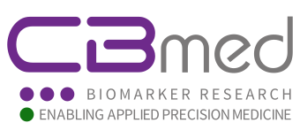Metabolomics research in Graz
Metabolomics, one of CBmed’s Core Technologies, is an emerging but powerful tool for precision medicine. Recently, CBmed filed a promising patent for non-invasive diagnosis of pulmonary hypertension (PH) based on this technology.
Metabolomics is defined as the study of chemical processes involving metabolites in a biological specimen. It is an emerging technology that can provide a better understanding of the state of cellular and biological processes at different stages. The term refers to the large-scale study of small molecules, commonly known as metabolites, within cells, biofluids, tissues or organisms. Collectively, these small molecules and their interactions within a biological system are known as the metabolome. The metabolome is thought to be the closest representation of phenotype and shows tremendous potential in applications ranging from understanding cellular processes in both normal and diseased tissues, environmental research, agriculture to biomarker discovery and personalized medicine.
Metabolomics is an important area of study because metabolites directly reflect the underlying biochemical activity and state of cells and tissue – something that other -omics technologies such as genomics, transcriptomics, or proteomics are unable to capture. Historically, few metabolites could be efficiently identified standard clinical chemistry techniques (e.g., cholesterol) but advanced metabolomics technologies such as Liquid Chromatography-Mass Spectrometry (LC-MS) can identify hundreds to thousands of metabolites. While the analysis and interpretation of a complex metabolomic profile or fingerprint is still challenging, these advanced technologies enable precision medicine at many levels, including the characterization of metabolic derangements that underlie disease, the discovery of new therapeutic targets and biomarkers to diagnose and predict disease, or monitor the activity of therapeutics.
A data analysis workflow in metabolomics usually consists of feature extraction, compound identification, quality control statistical analysis, and subsequent statistical interpretation together with clinical data. These tasks are performed at CBmed in collaboration with Joanneum Research. In many cases, such as for advanced biomarker discovery and validation, integration with other datasets or the creation of robust predictive models, a more advanced analysis is required. These tasks are performed by the Data Science team, whose expertise is focused on statistics, data analysis, and machine learning, with an emphasis on deep learning for image data. In biomarker discovery, there is often al limited amount of data and no previous hypothesis, so data scientists work together with the laboratories and medical experts to help interpret, make sense, and validate their findings.
While the analysis and interpretation of a complex metabolomic profile or fingerprint is still challenging, these advanced technologies enable precision medicine at many levels.
Metabolomics and Data Science
Data Science in CBmed follows four general principles: (1) use lean principles based on simplicity and “Occam’s razor” , (2) use „tidy data“ and open source tools that are standard and promoted by the scientific community, (3) ensure all experiments, analysis, and workflows are reproducible and allow for fast and efficient iterations; and (4) take into account and incorporate the feedback from the laboratories and clinicians.
These principles based on community standards, reproducibility and teamwork have proven successful in our research projects, many of them leading to robust industrial applications.
A first example is biomarker discovery for the diagnosis of pulmonary hypertension. Pulmonary hypertension is a progressive, fatal disease characterized by elevated pulmonary arterial pressure. Its diagnosis is extremely complex and time-consuming, and its confirmation requires a right heart catheterization performed by a cardiologist, an invasive and expensive technique. This project aimed at improving the process by finding diagnostic biomarkers in a blood sample using Liquid Chromatography-Mass Spectrometry (LC-MS). The preliminary results led to patenting this method (currently under evaluation) as a non-invasive diagnostic test for pulmonary hypertension that could result in a breakthrough in the field.
Another example of successful use of metabolomics for biomarker discovery is for quality control of blood samples. Blood samples are sensitive to many factors that could degrade their quality (e.g., long storage at an improper temperature) and make subsequent laboratory tests invalid. Within this project, CBmed discovered a metabolomic fingerprint that can identify blood samples that were incorrectly handled or stored. In this case, Probe ElectroSpray Ionization (PESI) was used, a relatively recent technology that is orders of magnitude simpler, faster, and inexpensive than other metabolomics techniques (e.g., LC-MS). This innovative approach opens a door for PESI to be used as a routine clinical laboratory test for blood quality control.
The examples described above are some of the projects at CBmed showing the usefulness and potential of metabolomics as a tool for research and for clinical applications. Another example is the study of the microbiome, of which you can find extensive information here.
The Author
Pablo Lopez-Garcia, PhD
Head of Data Science CBmed





